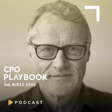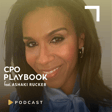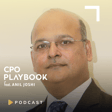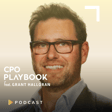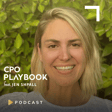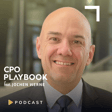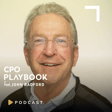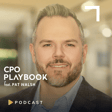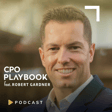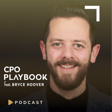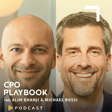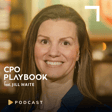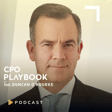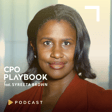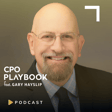Introduction to CPO Playbook
00:00:01
Speaker
I'm Felicia Shakiba, and this is CPO Playbook, where we solve a business challenge in every episode.
Challenges of Global Expansion
00:00:12
Speaker
In the United States, 73% of business leaders believe expanding into new markets is challenging. Navigating global expansion entails significant risks stemming from various factors. Chief among these are cultural differences, resource constraints, and internal lack of alignment on meeting diverse customer needs. Cultural nuances can profoundly impact business operations, affecting everything from customer preferences to communication styles and negotiation tactics. Resource constraints pose challenges in managing finances, talent, and infrastructure across different regions, adding layers of complexity to expansion efforts.
00:00:57
Speaker
Moreover, the internal lack of alignment on meeting diverse customer needs introduces uncertainty that can hinder strategic planning and investment
Introducing Nabin Kumar and Neteo's Challenges
00:01:06
Speaker
decisions. Fortunately, we have Nabin Kumar, CEO of Neteo, here to guide us on navigating these challenges effectively. Naveen, thank you so much for being here today. Naveen, what challenges do you face during Niteo's growth trajectory? And how did these experiences shape its evolution into a customer-focused organization amidst global expansion?
00:01:33
Speaker
First of all, thank you very much, Alicia, for hosting me. It's a great pleasure to be on your podcast. Coming to your question regarding what are the challenges which we have faced during my journey with Nithya Corporation. One of the big challenge was globalization. You start with a market and you tend to go from that market to next market. And that is where when you go from one market to another market, the biggest challenge is getting the right people which can drive your vision, people and go to market strategy. I would say these are the two main challenges while you are going on your expansion mode at a global level.
00:02:18
Speaker
And I seriously believe the third challenge which comes later as a part of your good growth is towards working with a great delivery. So three challenges. Number one, getting the good people which can share your vision. Number two, getting great customers which can believe on your vision and see getting people which can deliver your vision. So I think these were the three challenges in our journey in the last 18 years at MIT and for Tech Corporation.
00:02:52
Speaker
And I can see how vision plays a role in getting everyone aligned from all different perspectives of the business and the customer piece.
The Importance of Diversity in Expansion
00:03:03
Speaker
What role does diversity play to understand and mitigate cultural differences while expanding globally, particularly in customizing products and services to resonate with the varied markets? Very, very important question and it is very close to my heart. How to get diverse tail end? I simply believe in diversity. If you go to any one of our operation, we believe that the 70% of the tail end should be diverse tail end in that particular country, right? And 30% of the tail end with more expertise, whether it is technology expertise or vertical expertise, which is required, should be taken from outside
00:03:47
Speaker
So as a part of our principles, there are territories where we have taken 90% of the talent from that particular country. And 10% of the talent comes from other regions, which is predominantly on the consulting expertise, vertical expertise, or technology expertise. So we are big believers at Netio on diversity, because that will give you a much bigger think tank as an organization. how do you manage those diverse conversations? Because obviously they are bringing through innovation, right? But sometimes diverse cultures, they're meant to have these creative conversations pulling decision-making from one end to the next. So how do you manage those types of conversations and keeping them from getting too heated or off track?
00:04:43
Speaker
So we do that all the times. So if I have a very diverse talent and everybody is having their own opinion, right? First of all, we need to focus towards how do we get those opinions focused on our vision. We need to keep vision and execution as the core center for executing. Now, as a CEO and founder, I might be totally wrong, and you might be totally right. So I should have that maturity openness in the mind that anybody and everybody is talented. That's the basic principle. So when we have these principles intact, and I always say,
00:05:32
Speaker
Keep your ego at your home and lock it before coming. And throw the key also. When you go back home, take ego back. I don't care. But when you come in a meeting room, we are here for an agenda. Let's focus on agenda. Let's focus on vision and the brilliant mind will win in this conference. The brilliant mind can be from an average performing territory. The idea can be from a person who is more quieter and the guy who is speaking too much might not be the case.
00:06:09
Speaker
So it really depends how do we execute our vision, our core themes and our growth agenda as a center and keep everybody humility-wise at a level where we can have a meaningful conversations.
Innovative Onboarding with GenAI
00:06:30
Speaker
We talked a lot about vision so far, and I think that one of the biggest challenges in sharing and instilling vision are with new employees. What strategies did you employ to streamline the onboarding process for new employees in different countries, ensuring alignment with the company's vision across these different subcultures?
00:06:58
Speaker
So nowadays, the old and metal are very poor, which we used to deploy and we were not able to communicate more than 20, 30% of what we actually want to. But thanks to GenAI, where you have virtualization, where you have one-to-one vision, which you can share, and you can take your their feedback also. So I'll give you a very immersive experience through AR, VR, what we are trying to do now as a part of our new rollout. And I can't speak much because this it is an IP. So let us say you Felicia joins Nithya and he gets a AR, VR experience from the leadership team. We call it top 11 leaders have their vision, which is one-to-one given to you. So first two days, you're only hearing what are our thought process, what is our vision, where we want to become by 2030, what kind of company we would like to build up, how we are going to build up, and what is needed out of Alicia as an individual and as a collaborator to the entire ecosystem. I think that communication
00:08:05
Speaker
And giving the open mindness is the most important thing at the time of onboarding. We have the culture of open door policy as a part of our global key vision. And anybody and everybody can express themselves open ideas. And those ideas are listened very carefully, right? We do have a lot of gen AI techniques where you can submit an idea that, OK, this is where I think the company is going. And I can say there is a great merit in your i idea, and we are submitting this idea to adopt management. So we are that flexible and that tech savvy, where Felicia says, I think our sales strategy, this particular area, we think we have to adopt to this particular new mechanism.
00:08:57
Speaker
And I submit submit this idea to my AI portal, employee portal. And that idea, there itself on the merit of it, either gives you the answer that, OK, we have implemented this in these countries, or this is the past, or this is a great idea. And we can definitely work towards giving this as a part of highlight for our weekly meetings. What you just shared, I thought was so important and I hope our listeners are really hearing you because when a new employee comes through the door, the idea and the craving that they always have is how does my role fit into the bigger picture? And that's not always clear in onboarding. And the fact that you've shared, this is the strategy and this is the core of the process, I think is so important, especially with these diverse locations, so many locations that you have. Getting that alignment is so critical, but being able to share, where is the company going? How does my role fit into the bigger picture? What is the vision? That is so crucial.
00:10:04
Speaker
And then the flip side of being able to be a new employee and see opportunities of contribution and being able to provide that feedback almost immediately is also an incredible. I mean, that is just the definition of how you create like a fast-moving innovative business. And I can just see how beneficial it could possibly be, right, for NITIO. What are some of the benefits, I guess, that have come from that strategy? So from the beginning on the part of onboarding or when the employee role has been created, we have the entire vision from bank 2 to bank 11. You know how a particular person can be the CEO. So we have a product called Drisham. Drisham means you can see yourself as a CEO of this company.
00:10:56
Speaker
if you are capable and what you need to do to become the CEO of this company from today towards the end of your role. So hire to retire. you know Do you see in next 10 years what are the steps you need to do? What is the best case study in this company of highest growth and what that particular employee has done? So we have all that creative data to excite our new employee to envision. Drishya means seeing the future. And we have implemented that as a part of our own work.
Ensuring Global Alignment at Neteo
00:11:37
Speaker
How do you establish effective communication channels and alignment mechanisms between organizational units, particularly in the context of a diverse global environment?
00:11:50
Speaker
So we have a very tender communication on mechanism. We have the country leaders, various country leaders across the globe in more than 50 countries across the globe where we have nice operations, we have development centers, we have software development labs and each leader is a but in a vertical or horizontal. Now, if I am a global leader in Gen AI, now all the other leaders of various countries and you are in Germany and you are a telecommunication vertical experts and I am the country head of the United States and I'm Gen AI leader. So it is natural to have a communication.
00:12:37
Speaker
It is natural to work with you. It is natural to have alignment with you because I require your expertise as a part of my go-to market in telecommunication. And you require my expertise as a part of Gen AI. So it is the thought leadership which unite these all, I call it, eye lengths very well and make it united, like United States. I think in so many organizations that I've consulted with, this is but one of the hardest things to get right. I think the cross-functional communication is so critical and so important that sometimes people or leaders are just so thoughtful about what they're doing and what their team is doing, but they forget this
00:13:25
Speaker
cross-functional collaboration that's so important to the overall vision, like we've been talking about the business. Can you provide an example? You talked about thought leadership and being able to lean on the leaders to make those connections. What are they doing? What are their strategies? Do they meet every so often? Do they share goals? How do we make sure they stay accountable for those types of collaborative working environments? So the best example is that everybody has to present thought leadership. Once in a quarter, every country had has to communicate or leader has to communicate at least with 10 leaders on active engagements in a month. And every leader at a global level has to present at least 10 new thought papers, white papers ah across the globe. So collaborative effort, you cannot escape from any one of these things.
00:14:22
Speaker
When they meet, when they catch up, it's like a delight to them. Hey, I had got this from you. And every quarter when we catch up virtually or face to face once in a year for sure, every leader has to give their thought leadership in a 15 minute summarization that beside my wonderful country where I'm working, how I was able to spend 20 to 30% of my time collaborating with other people's everything. And I think that is very important as a part of culture. How did NITIO foster cross-functional collaboration between product and sales teams to address customer feedback and adapt offerings to evolving market demands?
00:15:13
Speaker
Yeah, so it all starts with our front liners. I call them the sales director team. So Nityo has their venture arm, which is called KFC Ventures, Karma Free Capital. And Karma Free Capital invest into product companies. Both are privately held. One, invest heavily into product companies so that we can go to market strategies for these product companies to globally add through Nityo. So if Nittu has 4,000 enterprise customers and Felicia is one of the company where KFC venture has invested. Now, how do I take this particular product at a global level in 50 countries with 700 plus sales people or market makers?
00:16:00
Speaker
and get a real-time feedback which will take ages for Felicia to reach to all these customers and these verdicts. So each and every sales guy has to organize demos, take feedback. Is it genuinely solving your problem? and consolidatedly we get 100 minimum such feedbacks from our customers whether it is fit to the market or we whether this particular product is good to go with global strategy.
00:16:38
Speaker
or we require improvement, or we require major improvements. It's a demand, but the product, we are only 30, 40%. If you have 70% there, yes, this product will do wonders. So all that mechanism is captured for all the product at a global level to give sense to the engineering teams, the chief product officers, and to the entire customer success team. And that's incredible feedback for all of those functions or both of those functions to come together and discuss and collaborate. And I think that is the glue between those those functions to really see and feel the feedback and seeing what's going to sell and what product iterations that need to be done. That's a ah fantastic strategy. I love that.
Fostering a Learning Culture
00:17:30
Speaker
You had mentioned to me prior the significance of cultivating a continuous learning culture. What was its impact on driving growth and innovation amidst the rapid pace of the company's expansion? I think at the end of the day, it is the people, it is the motivated people. I've seen, I can't categorize overall, but I've seen people productivity becoming double. And I have live cases, there is a guy, I can't tell you his productivity, how it has impacted. The guy who used to do, let us sit two deals in a month is today at 500% increase because of this.
00:18:12
Speaker
But overall, we have measured this in last three years. We are able to consistently have seven to 10% impact on the people's productivity by showing and motivating and giving them more information and showing them drishcham, which means that how you can be different, how you can be the CEO of this company, how you can be the gold medalist, Again, it is not a race, everybody goes with their own pace, but I can tell you a small improvement of their thinking alignment to the goal vision and what they need to achieve every day for five to 10 minutes hammering can absolutely produce wonderful results in my view. And that is what we have seen in last, what we call it as 1000 days impact.
00:19:07
Speaker
How do you measure that impact? Is it through survey? How do you measure productivity? What does that look like, an increase in productivity and motivation and work? different departments, if I take the case of finance, how the DSO is increased, accounts payable, account receivable, how we are dealing with our banking, how efficient we are, how we are able to save, because CFO office is efficiency and savings. If I take the engineering, how well they are able to finish their coding, their deployment, their CICD,
00:19:45
Speaker
their entire execution flawlessly can be a measurement of that in case of chief product officer office. So there are different parameters to measure productivity. How fast you're able to bring the product can be the combination of collaboration between engineering and CPO. And how many more customers you're able to engage is the measurement of the entire business development team. how much cross selling you are able to do and how well your product is implemented is customer success. How many less number of calls which are coming is the overall quality of your product. So there are n number of parameters and depending upon the department, you measure these parameters on quarterly basis and produce overall productivity of the company. And if I'm able to improve the productivity but between seven to 10% continuously year after year,
00:20:42
Speaker
We are a total different company after five years. How do you cultivate a performance-driven culture free from political influence, ensuring equitable compensation and action-oriented meetings to attract top talent for critical roles?
Performance-Driven and Collaborative Culture
00:21:00
Speaker
So Felicia, people work for people, not for companies. Remember that. People never work for companies. People work for people. If my boss is great and if he or she is doing a startup, there are very good chances if I'm totally satisfied because satisfaction comes as a part where I need to report every day. How does my boss, my colleague, seize me? And if I cultivate that environment,
00:21:29
Speaker
of collaboration from the beginning. I think that collaboration can take 80% of the problem out. There is no ego. Please come, contribute the best. You can be the CEO of this company. The sky is the limit. And I'm not saying for the sake of saying, improve yourself. Those are some of the core items if I'm able to facilitate. And if I'm able to get as a code game, everybody should believe. on to that. And I'll say by stating Hila Prabhupada, when he came to America, he said, I can wake up those people which are sleeping. I cannot wake up those people which are pretending to sleep. So if we can take out the pretension that, oh, I believe in this and that, do you really believe as a core value of the company? So if we are able to create that culture, yes, I'm very valuable for this company.
00:22:29
Speaker
Yes, I'm contributing towards the success and growth of this company. Yes, I'm responsible for my area and how I can improve is majority my portion. And yes, I'm ready to listen, learn from my colleague rather than compete. And having grittias onto that, if you are able to create that culture, I think then we are talking a good atmosphere for people to include. And that culture starts with you at the top, executive leadership.
00:23:11
Speaker
Absolutely. I say if anybody do politics in the company, that's the last day of that particular person. Performance is God. Performance is God. We need to measure and worship performance. we need to worship collaboration. That's why the culture starts with me and it goes to every country head across the globe. And then at the end of the day, that particular collaboration with other leaders, that collaboration of sales with other sales, that collaboration of customer success with other customer success, thought leadership can change the organization
00:23:56
Speaker
to a steering level towards vision. Leadership is so important in an organization at the top, but also at the local level. What what role does leadership at the local level play with Meteos expansion?
Local Leadership and Innovation
00:24:15
Speaker
I think local level is where is the granular level where we get the real growth. So each and every box should be totally aligned. And that is weird. It's like a train and if they're not totally aligned and one is pulling another train cannot move fast. And we're talking about super fast train at Nityo. So it is very important for each and every leader to have the same values and culture in that country embedded. And that is the part of
00:24:52
Speaker
my co-leadership to grow, work at a granular level, talking to people, taking, if I'm four days in Singapore, I have four different dinners with different people, four different lunches, four different breakfast, so that everybody can be taken care of. And you see whether the culture, what our vision is, Let them speak about the vision. Let them speak about the company. Let them speak about how successful he or she is in the company. It's their talking time for half an hour, right? And let the group come. Let them see and see because that is where the next blood, the next leadership
00:25:40
Speaker
next people are coming at Nithyao. So, I think it is, it starts from top to bottom. If I think, oh, I go to a country and country is the most important guy and that's it. No, we are killed. We are killing the innovation there itself. Going to the next level in that country and trying to see, can I learn from them? Oh my God, I haven't thought in Philippines that particular thing which I can implement in Germany or Italy is great in that particular area and that is a learning for me also and sharing that learning ah across the globe is the culture of innovation. So till the time an organization doesn't have
00:26:25
Speaker
Culture of innovation, how you can innovate. Again, I cannot wake up a person which is pretending to sleep. Oh, yeah, yeah, yeah, yeah, I can do that. Actually, I'm not listening. I'm just doing a lip service, but we should do hard service.
Embracing Diversity for Global Success
00:26:41
Speaker
What advice would you offer to other leaders seeking success when expanding globally? I think one of the most important thing is to learn diverse culture. Value every culture as you value your own culture. And be at the ground level with the people to learn how to do business, how does customer do business in that particular, how to attract the best employees,
00:27:08
Speaker
create a very open door culture in the organization. and that's It sounds like you've done that. Absolutely. Nobody's perfect in this world, but we are going towards where our vision, values, life, and we are open heartedly working towards those goals. Well, Navin, I am excited to see where Nitya goes next. So thank you so much for being here. And your time has been absolutely of great value. Thank you. Thank you very much, Felicia. I hope you had a wonderful time.
00:27:47
Speaker
That's Navin Kumar, CEO at Meteo, based in Cupertino. If today's episode captured your interest, please consider sharing it with a friend or visit cpoplaybook dot.com to read the episode or learn more about leadership and talent management. We greatly appreciate your rating, review, and support as a subscriber. I'm Felicia Shakiba. See you next Wednesday and thanks for listening.

